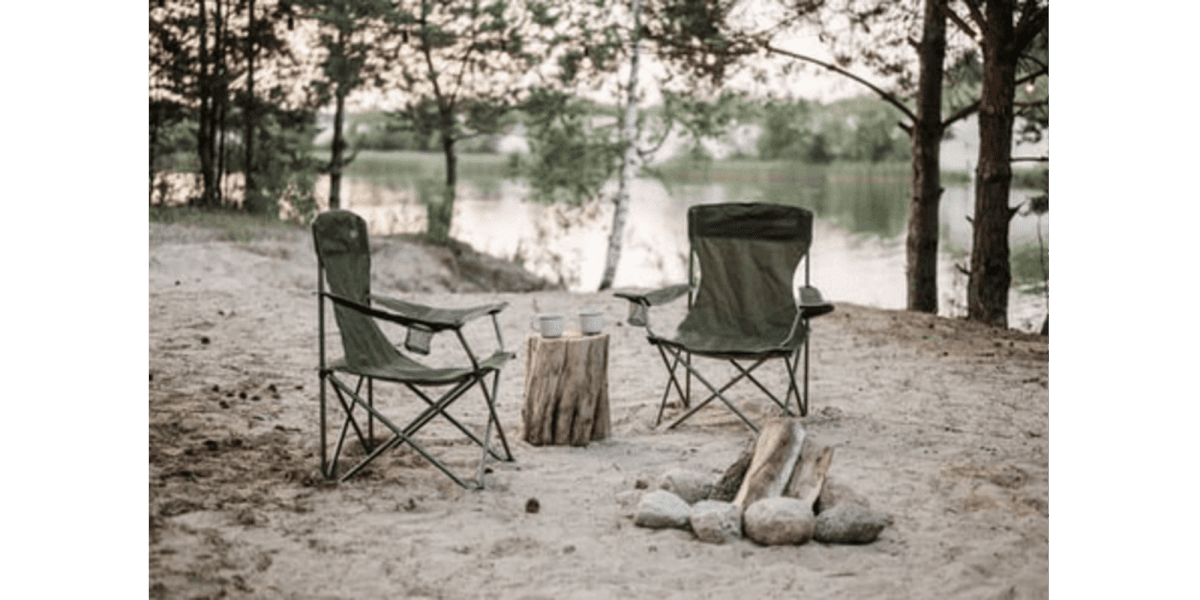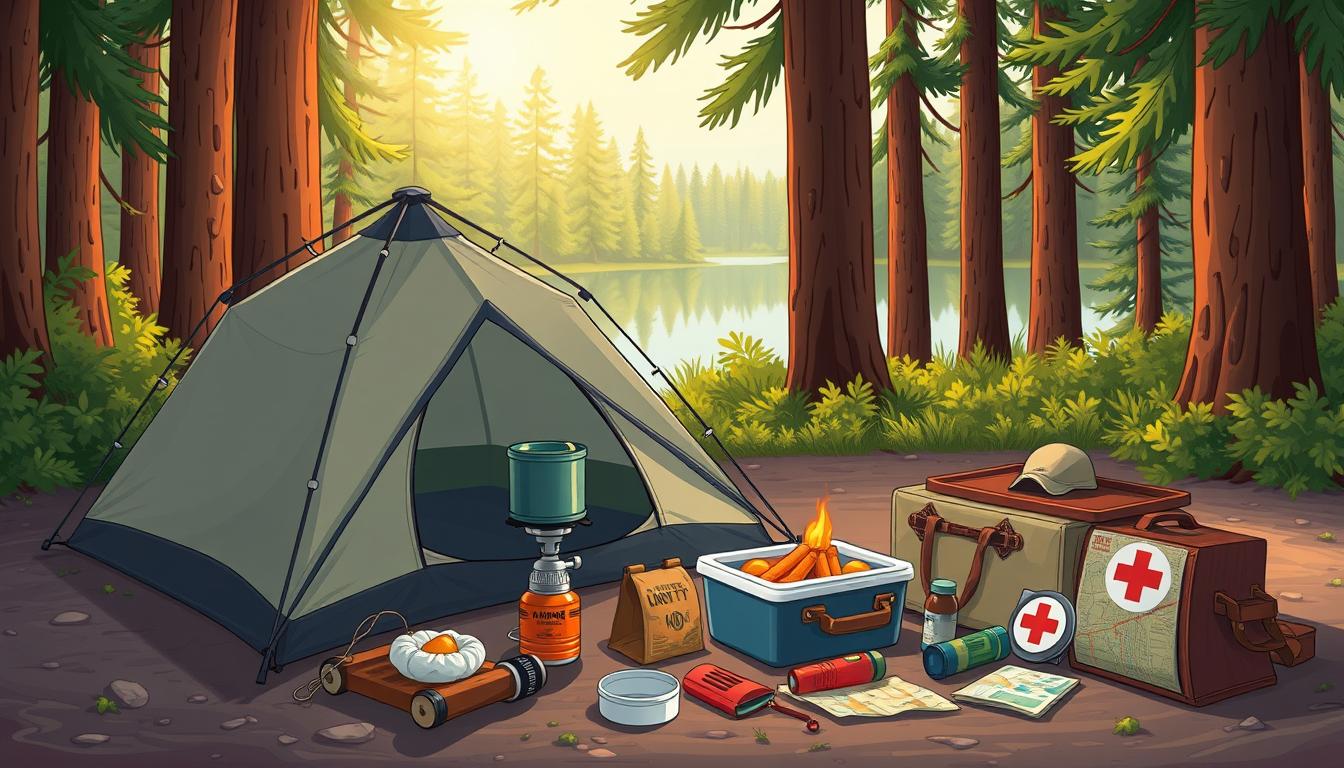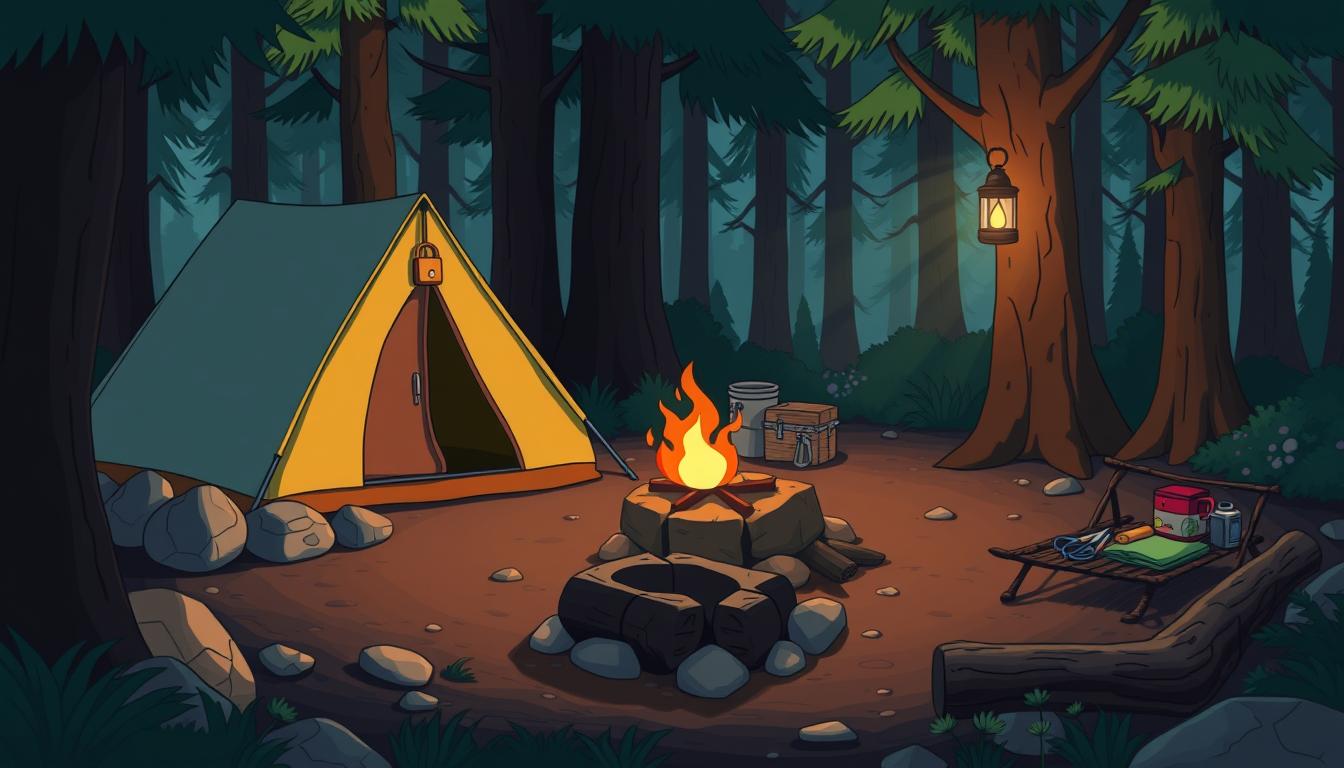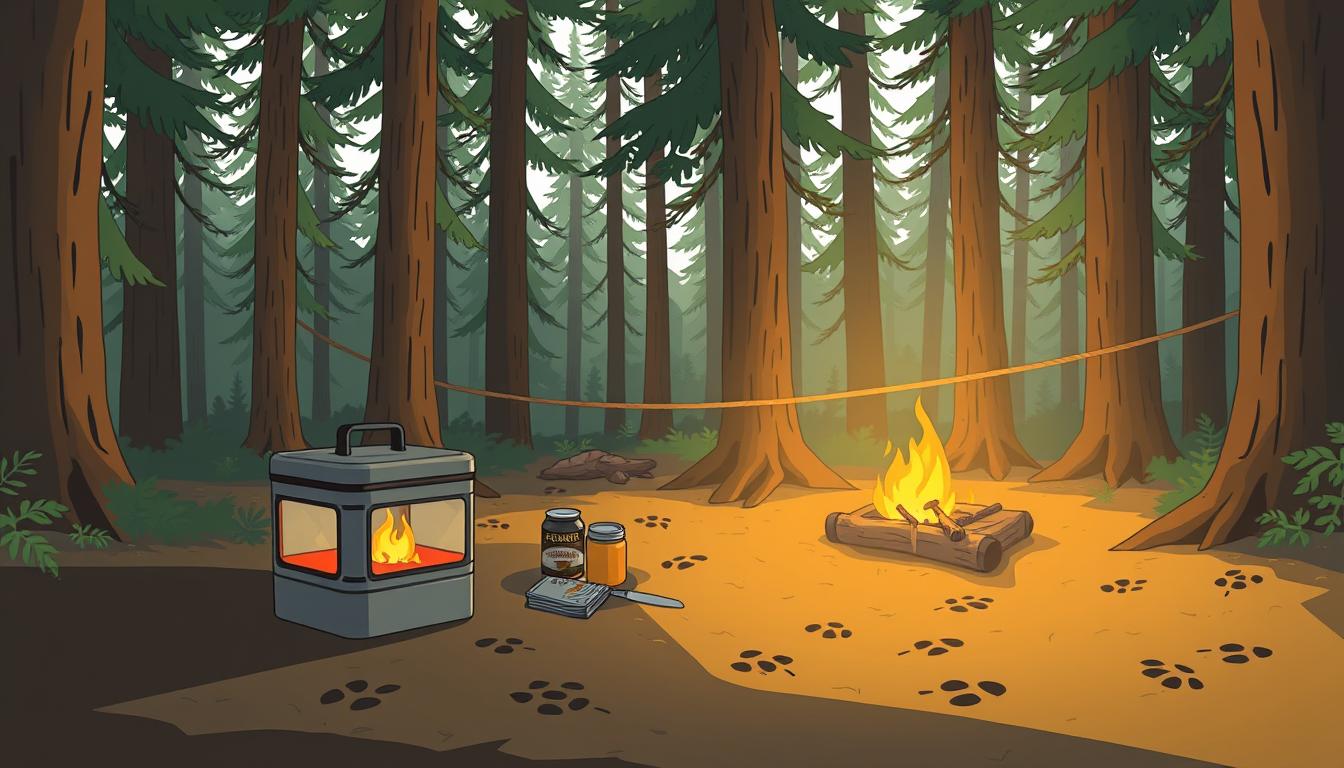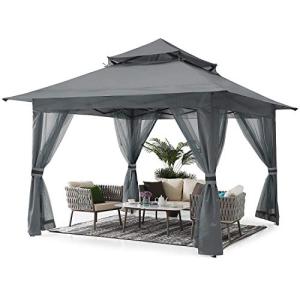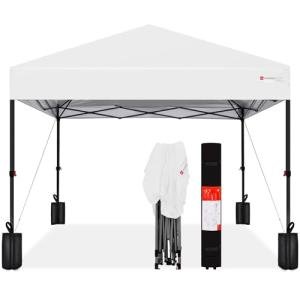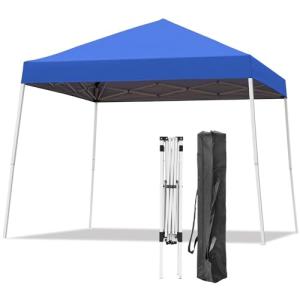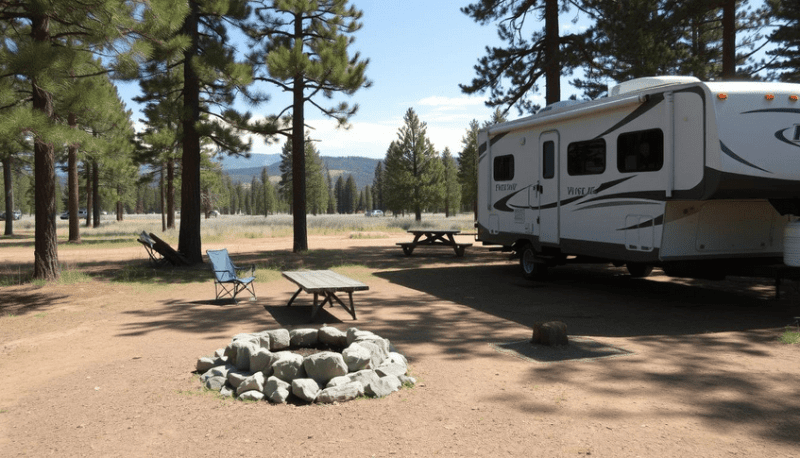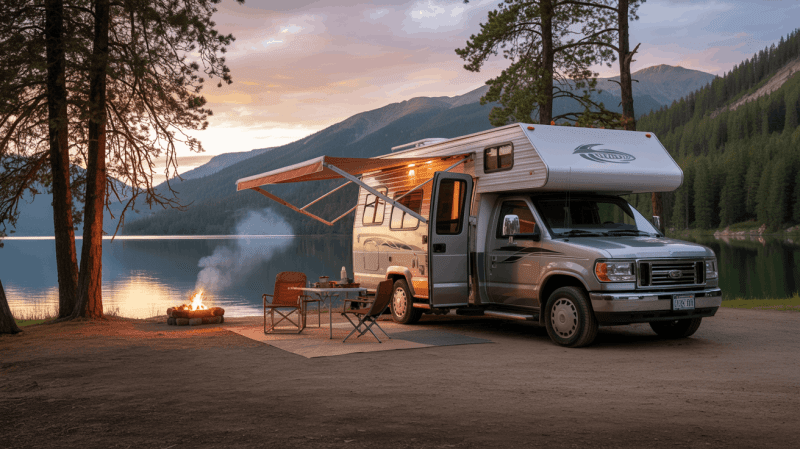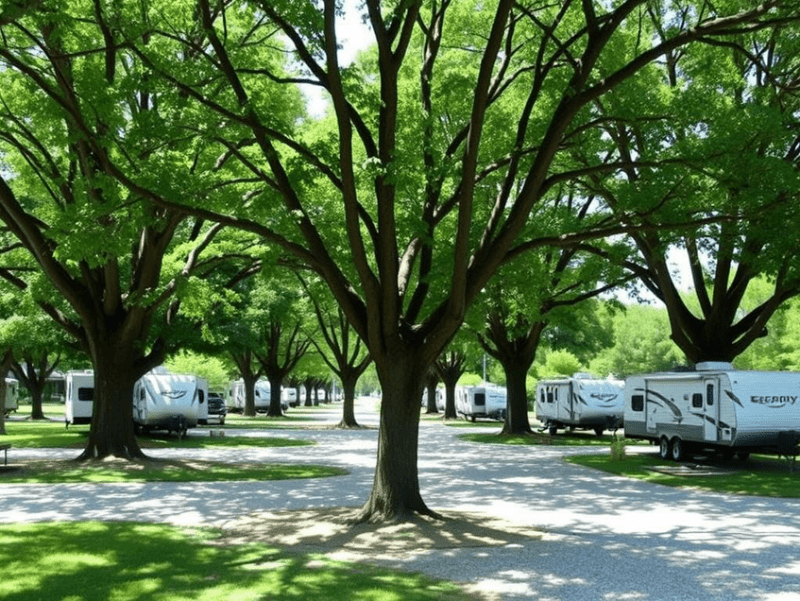As the weather warms, many people look forward to camping. They love exploring the wilderness and connecting with nature. But safety is key when you're outdoors. Planning and preparing well for a safe and fun camping trip is important.
This guide will help you with outdoor preparedness, wilderness safety, camping essentials, and responsible recreation. You'll learn how to reduce risks and make the most of your camping adventure.
Key Takeaways
- Prioritize safety and preparedness for a successful camping trip
- Research your camping destination and monitor weather conditions
- Properly store food and take precautions against wildlife encounters
- Adhere to strict fire safety guidelines and exercise caution with campfires
- Assemble a comprehensive first aid kit and know how to respond to emergencies
Essential Pre-Trip Planning and Preparation
Planning well is key to a safe and fun camping trip. Before you go, research your campsite, watch the weather, and make a detailed packing list. This way, you'll be ready for anything that comes up.
Researching Your Camping Destination
Start by learning about your campsite. Know the rules, any permits needed, and the local conditions. This helps you choose the right spot for your group's needs and skills.
Weather Forecast Monitoring
It's vital to keep an eye on the weather. Outdoor weather can change fast. Have a backup plan for unexpected weather. Check forecasts often before your trip and adjust your plans if needed.
Creating a Comprehensive Packing List
Making a detailed camping gear checklist is crucial. Think about how long you'll stay, the weather, and what you'll do. This ensures you have the right gear and clothes for comfort and safety.
By researching your camping destination, monitoring weather forecasts, and creating a comprehensive packing list, you're set for a great camping trip. Remember, good planning is the secret to a safe and enjoyable outdoor adventure.
| Top 10 Essential Camping Gear | Quantity |
|---|---|
| Navigational supplies (compass, map, GPS) | 1 set |
| Sun and insect protection (sunscreen, bug spray) | 1 each |
| Insulation (warm clothing, sleeping bag) | 1 set |
| Shelter (tent, tarp) | 1 set |
| Illumination (flashlight, headlamp) | 1 each |
| First aid kit | 1 |
| Firestarter (matches, lighter, tinder) | 1 set |
| Extra food and water | Sufficient for the trip |
| Repair kits and tools | 1 set |
| Communication device (cell phone, walkie-talkie) | 1 |
"Proper planning prevents poor performance. Take the time to research your camping destination, check the weather, and pack the essentials to ensure a safe and enjoyable outdoor experience."
Campsite Selection and Setup Safety
Choosing the right campsite is key for a safe and fun camping trip. Arrive during daylight to check the site and set up. Look for flat ground, away from dead trees or branches that could fall.
For tent camping, use a plastic ground cover to stay dry. It protects you from the weather. If you're in an RV, make sure it's hooked up right and stable. Follow all campground rules and respect the environment and other campers.
Be aware of your surroundings and any dangers like wildlife or natural features. These could be risks to your safety.
| Campsite Safety Considerations | Recommendations |
|---|---|
| Tent Placement | Use a plastic ground cover to stay dry; keep at least 15 feet away from fire pits or cooking areas |
| RV Positioning | Ensure proper hookups and stabilization; follow campground regulations |
| Campfire Safety | Keep campfires at least 15 feet away from tents, RVs, and flammable vegetation |
| Hazard Awareness | Identify and avoid potential threats, such as dead trees, steep terrain, or wildlife habitats |
By choosing and setting up your campsite wisely, you can avoid risks. Always be aware of your surroundings. Follow campground rules to protect the environment and respect other campers.
"Proper campsite selection and setup can make all the difference in creating a safe and comfortable camping experience."
Food Safety and Wildlife Prevention
When camping, it's key to store food right to avoid sickness and wildlife visits. Safe food habits mean you can have fun outdoors without worry. They also help avoid risky situations.
Proper Food Storage Techniques
Keep all food, like snacks and drinks, in sealed, waterproof containers. Use insulated coolers or bear-safe boxes. Never leave food out or in your tent, as it might draw wildlife. Keep raw and cooked foods separate, and wash your hands often when handling food.
Wildlife Encounter Prevention
To keep wildlife away, dispose of food waste and keep your campsite clean. Use food storage lockers if you can. When you see wildlife, stay safe and never feed them.
Safe Food Handling Practices
Handling food safely stops food sickness. Wash your hands before and after cooking, and use different boards and tools for raw and cooked food. Cook perishables to the right temperature, and keep cold foods cold in your cooler.
"Seventy percent of campsites that stored food properly reported a decrease in wildlife disturbances compared to sites where food was left accessible."
Focus on food safety and wildlife prevention for a great camping trip. Your safety and the wildlife's depend on your careful actions in nature.
Camping Safety Tips: Staying Safe in the Great Outdoors
When you head into the wilderness, safety comes first. To have a safe and fun camping trip, follow these important tips:
- Plan Your Adventure: Tell someone where you're going and when you'll be back before you leave. This helps rescue teams find you quickly if something goes wrong.
- Navigate with Confidence: Carry a map, compass, and GPS. Know how to use them. Stay on marked trails and keep an eye out for your surroundings to avoid getting lost.
- Stay Hydrated and Nourished: Bring lots of water and drink it often, even if you're not thirsty. Pack healthy snacks and meals to keep your energy up.
- Dress for the Elements: Wear sturdy hiking boots and clothes that match the weather. Dress in layers for cold weather and carry rain gear for sudden storms.
- Be Prepared for Emergencies: Carry a whistle, flashlight, and emergency shelter. These can help you signal for help or find shelter if needed.
- Hone Your Survival Skills: Learn basic survival skills like building a shelter, starting a fire, and signaling for rescue before your trip.
By following these camping safety tips, you can have a safe and fun outdoor adventure. Being ready and alert are the secrets to a great camping trip.
| Camping Safety Statistic | Value |
|---|---|
| Percentage of incidents where lack of trip planning resulted in accidents or injuries while camping in Pennsylvania | 75% |
| Average distance traveled each day by campers on multiday trips in Pennsylvania | 12 miles |
| Ratio of campers equipped with proper nighttime gear to those traveling after dark without necessary equipment | 2:1 |
| Frequency of emergency calls made by campers who did not inform anyone of their planned trip in Pennsylvania | 1 in 20 trips |
"Proper planning and preparation are the keys to a safe and enjoyable camping adventure."
Fire Safety and Prevention Guidelines
Campfires and outdoor cooking are key parts of camping. But, they also carry a big fire risk. It's vital to follow campfire safety guidelines and fire prevention practices for a safe trip.
Campfire Setup and Maintenance
Build campfires in designated pits or rings, at least 15 feet from tents, shrubs, or trees. Use only seasoned firewood and keep the fire small. Never leave a fire alone, and make sure to put it out with water before leaving or sleeping.
Fire Emergency Protocols
Have a plan ready for fire emergencies. Keep a fire extinguisher, water, and a shovel nearby. Learn how to use a fire extinguisher and know where the nearest fire department is.
Safe Cooking Practices
Use a stable camp stove for cooking, keeping it away from flammable things. Don't cook with open flames, and watch out for wind that could spread sparks. Always watch cooking and make sure the stove is out after use.
Following these fire safety guidelines and fire prevention practices lets you enjoy the outdoors safely. Remember, campfire safety and careful outdoor cooking are key for a great camping trip.
Weather Safety and Emergency Preparedness
When you go outside, it's key to be ready for changing weather. Campers need to watch for extreme weather readiness because weather can change fast. Being ready for severe weather contingencies is vital for a fun and safe camping trip.
For your outdoor emergency preparedness, bring clothes for all kinds of weather. Learn about heat exhaustion, hypothermia, and other health issues from weather. Have a plan to find shelter quickly if a storm hits.
- Avoid high ground, water, and tall objects during thunderstorms.
- If camping in areas prone to natural disasters like floods or wildfires, know your evacuation routes and emergency procedures.
- Stay informed about weather alerts and warnings by carrying a weather radio or using weather-monitoring smartphone apps.
Being proactive and careful can make your camping trip safe and fun, even with unpredictable weather. By focusing on extreme weather readiness and having a solid emergency planning strategy, you can enjoy the outdoors with confidence.
"One-third of lightning fatalities occur because people leave their shelters too soon."
Thunderstorms can get very intense, quickly turning a light rain into a strong storm. They can also have downburst winds over 100 miles per hour, which is dangerous for campers. Always seek shelter right away when severe weather hits and stay there until it's over.
Camping in areas at risk for disasters like floods or wildfires needs more planning. Know the emergency evacuation routes and procedures for your campsite. Be ready to leave quickly if you're told to.
By focusing on weather safety and staying proactive with emergency planning, your camping trips can be safe, memorable, and without weather surprises. With the right preparation and attention, you can enjoy the outdoors confidently and worry-free.
First Aid and Health Considerations
When you go camping, being ready for anything is key. A good first aid kit is a must-have. It should have bandages, antiseptic wipes, pain relievers, antihistamines, and any medicines you need. Know what's in your kit and how to treat common outdoor injuries like cuts and sprains.
If you have a medical emergency, know where the nearest hospital is. Also, learn basic first aid and CPR. If you have allergies, carry your medicines, like an EpiPen.
Essential First Aid Kit Components
- Bandages (adhesive, gauze, and wound closure strips)
- Antiseptic wipes and ointment
- Pain relievers (acetaminophen, ibuprofen)
- Antihistamines
- Tweezers and scissors
- Thermometer
- Medications (personal prescriptions)
Common Outdoor Injuries Treatment
- Cuts and scrapes: Clean the wound, apply antibiotic ointment, and cover with a bandage.
- Burns: Cool the burn with cool water, apply aloe vera gel, and cover with a sterile dressing.
- Sprains: Rest, ice, compress, and elevate the affected area.
- Insect bites and stings: Clean the area, apply a cold compress, and use an antihistamine if needed.
Medical Emergency Response
If there's a serious medical emergency, stay calm and act fast. Call for emergency help and tell them where you are. While waiting, do basic first aid to keep the person safe.
Conclusion
Camping can be very rewarding and memorable if you follow safety tips. Plan your trip well, prepare for different situations, and watch out for dangers. This way, you can enjoy the outdoors more.
Remember to care for the environment and follow local rules. This is important for responsible camping.
With the right knowledge, your camping trip can be safe and unforgettable. Make sure to store food right to avoid animal problems. Keep a first aid kit ready and watch the weather and fire safety. These steps help make your adventure exciting and worry-free.
Whether you're experienced or new to camping, safety is key. It lets you enjoy responsible camping, outdoor adventure safety, camping trip preparation, and wilderness safety tips fully. Go camping with confidence and make it a memorable journey.
FAQ
Q: What are the key aspects of pre-trip planning for a safe camping experience?
A: Planning ahead is key for a safe camping trip. Research your destination to know the rules and local conditions. Also, check the weather often and make a detailed packing list.
Q: How can I choose a safe and comfortable campsite?
A: Choosing the right campsite is important. Arrive during the day to check the site. Look for flat ground and use a plastic cover for tents. Follow the rules and Leave No Trace to protect the environment.
Q: What are the best practices for food handling and storage to prevent wildlife encounters?
A: Handling and storing food right is crucial. Use tight, waterproof containers and coolers. Never leave food out or in tents. Wash hands often and follow wildlife safety tips.
Q: What are the key safety considerations for hiking and outdoor activities?
A: Always tell someone your plans and when you'll return. Carry a map, compass, and GPS. Stay on trails and know basic survival skills like building a shelter and starting a fire.
Q: How can I ensure campfire safety and prevention?
A: Campfire safety is vital. Build fires in designated areas and keep them small. Never leave a fire alone. Be aware of fire bans and have a plan to put out the fire before leaving.
Q: What are the essential considerations for weather safety and emergency preparedness?
A: Weather can change fast outdoors. Pack right and know health signs from weather. Carry a weather radio and know evacuation routes. Stay informed about weather alerts.
Q: What should I include in my camping first aid kit, and how can I be prepared for medical emergencies?
A: A good first aid kit is a must. Include bandages, wipes, pain relievers, and personal meds. Know how to treat injuries and allergic reactions. Learn first aid and CPR, and know where to find medical help.
DISCLAIMER
This document is provided for general information purposes only and should not be relied upon as providing legal advice, technical, or specific operational guidance to the reader, whether as to the practices described in the document or the applicable legal requirements and regulations. bestcampingdeals.com expressly disclaims any responsibility for liability arising from or related to the use or misuse of any information in this document.
